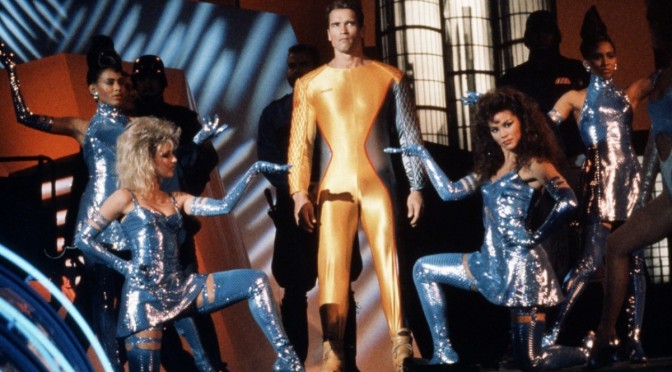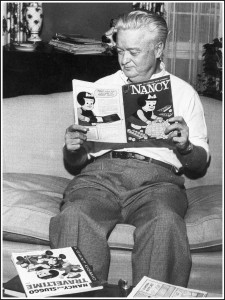Last week, I went over some things I’ve seen or heard from writers, critics and even the audience about the relationship between the creators and their audience. The contract, the acceptance of new words and even the idea that there were no new ideas. But, when addressing “no new ideas” I came to think about it and realize that there was still something to be said about that. I’ve already expressed my opinion on the concept that there were “no new ideas”, but there are facets that I didn’t think to talk about at the time.
Namely: Why is it that an idea that clearly has roots in conventions has managed to surpass others of its kind?
One of the things I often hear about Hunger Games is how relevant to the times it is and how it reaches to the current generation and the culture they live in. The people who bring this up often talk about how Hunger Games easily mirrors our culture and our obsession with reality TV shows and how this would not have been relevant at any other time. Except, you know, when the Running Man did a similar concept to take a shot at game shows.
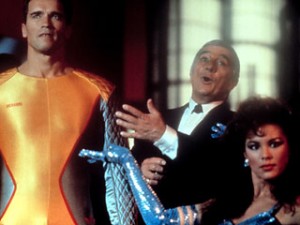 |
| Arnold is unsure how he became a prize in the showcase, the 80s were hazy for him |
But a dystopian future where society is controlled by a select few people that happen to be lucky enough to live in the upper class is something that touches on the fears of the modern day. Occupy Wall Street, the Tea Party and all of the little movements in between are a driving factor in our society today which the audience can relate to. Sure, similar concepts of an oligarchy controlling the lives of the masses were featured in Orwell’s Nineteen Eighty-Four but that was written in 1949 and directed at a completely different culture.
Nineteen Eighty-Four was written in a starkly different environment. They had just come out of a long, harsh war that the US was dragged into by an…attack on US soil… carried out by… suicidal pilots. But there were also worries of foreign countries plotting against American interests while studying dangerous sciences that could result in… nuclear proliferation. But, wait a moment, most importantly there was a driving fear among the people about the battle of ideologies between capitalism and…communism.
Okay, fine, so the concept isn’t uniquely targeted towards the generation of today and these ideas have all shown up before back when there was something remotely similar. Hell, the author even admits that the concept was rooted in things that had happened during the Roman Empire ages ago. So if that’s not the thing that is driving it then it has to be the teenage romance taking part in it. After all, the teenage romance has worked wonders for the trendy things in the last couple of years. Except… Hunger Games is actually doing better in the box office than Twilight right now too…
Well shit, what is the unique element that makes this thing successful right now? Why is it doing better than other things that have used similar concepts in the past? What is it that makes it unique enough to have this much power behind it?
Timing.
A lot of times people forget that, despite the fact they may have seen the idea before, not everyone has. The Running Man was made before most of the audience of the Hunger Games had even been born, some of them having been born and too young to remember anything about it. Nineteen Eighty-Four was created before some of their grandparents had even been born. Hell, it was created before our President was born. And in the end, it doesn’t have to be uniquely relevant, it just has to be relevant at all. People and ideas can be worthwhile for the same reasons in two different eras.
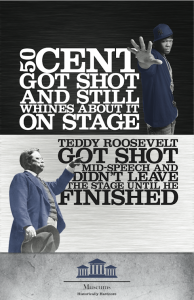 |
| Though sometimes the classics are still better |
And if you were to present some of these older works to them, they would likely notice that there was a relevancy to aspects of their life too, likely colored a bit by the eras they were created in, but having a timeless nature of echoing their fears and their life experience. As I pointed out last time, the one constant in fiction that works is human nature, an element which has not changed since the dawn of civilization.
Oh, sure, the labels change, the images change, but the basic concepts of what drives us never do. Centuries ago they may not have had communism to worry themselves over, but they did have monarchies which had a pretty similar effect of “the ruling class has absolute control”. They didn’t always have a fear of an apocalyptic war, but they did have war in general. And sure, they didn’t have nuclear weapons, but they had Vikings…which you have to admit would have made people shit themselves in the same fashion.
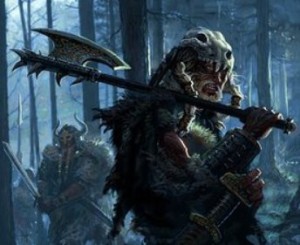 |
| A picture says a thousand words and still doesn’t cover this story |
Often I’ve heard of middle aged editors rejecting a concept presented to them because it’s like something that they had read in the past. My first ever submission to a magazine was rejected based on the concept that they had seen similar stories to it in the past. Now my concept is still around and magazines are not, so which of them is more timeless? Oh, and for those of you who are unsure what a magazine is, here’s a picture.
I’m not saying don’t strive for originality or new ideas, but keep this in mind, no matter what you do, always try to keep things relevant to the modern conversation and you’ll have a chance of catching their attention. Thankfully, this should be easy since you live in this world and can take note of the things that keep you awake at night.
I just hope Iran never gets them.
As for me, I think my books touch on quite a few social issues. But you’d have to buy them to know for sure. (I just touched on greed ^_^)


